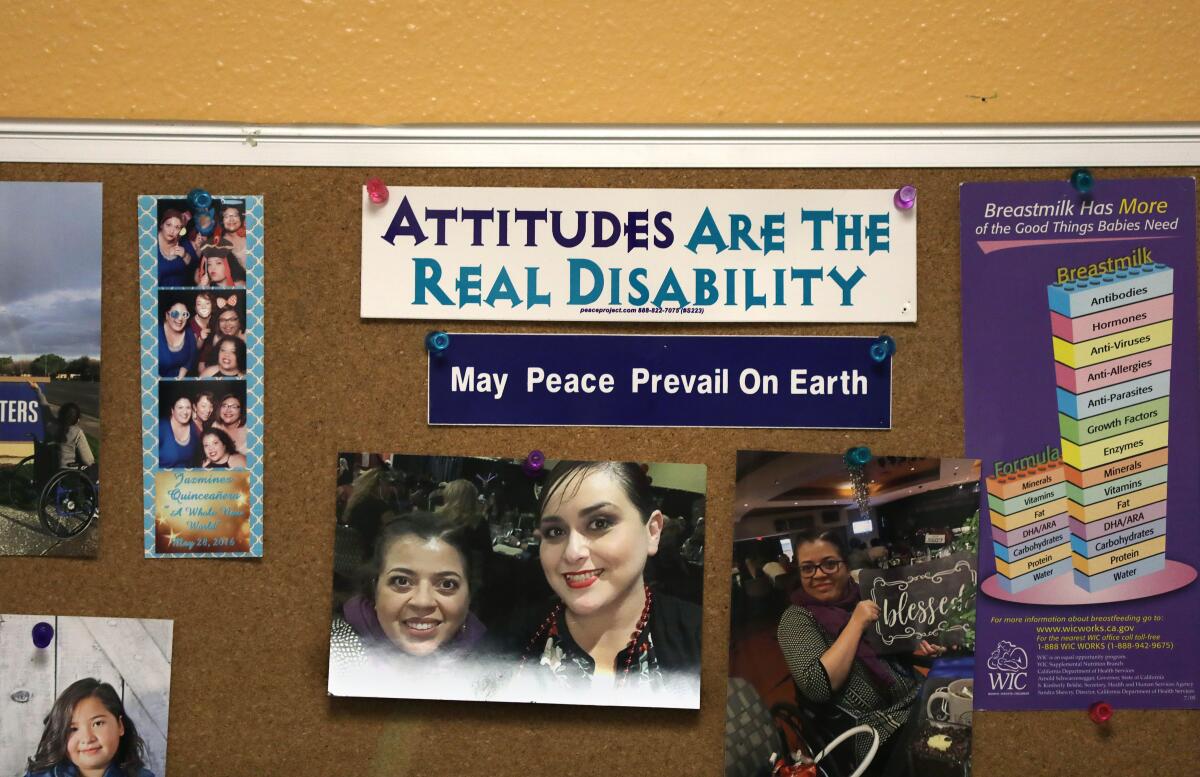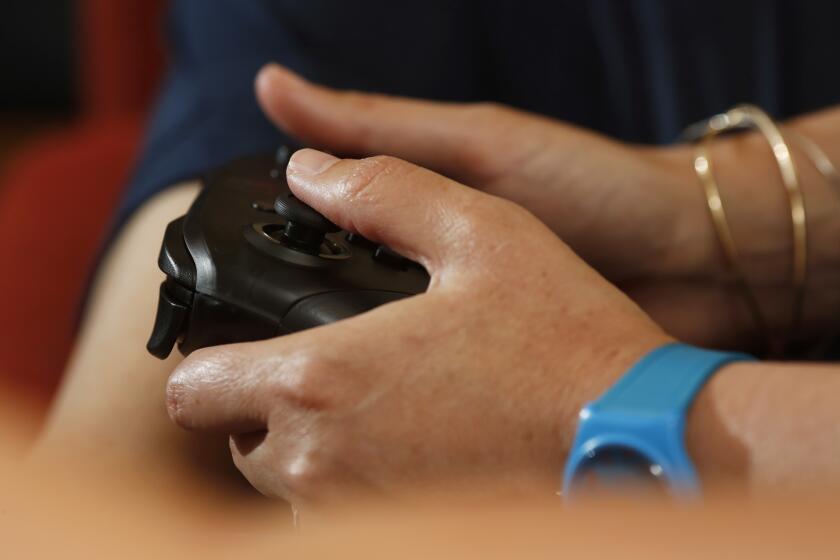Three lessons from disabled mothers

This is the Oct. 4 edition of the 8 to 3 newsletter about school, kids and parenting. Like what you’re reading? Sign up to get it in your inbox every Monday.
Last week, I launched a project nine months in the making: an investigation into the dangers and indignities disabled women like me face when we become mothers.
As I detailed in my story, disabled women now get pregnant and give birth at the same rate as nondisabled ones — yet we do so in the face of enduring social stigma, provider ignorance and persistent medical harms that cannot be explained by our own biological complexity or anatomical differences.
What was most striking to me in reporting this story is that disabled parents actually significantly outnumber disabled children, yet there was virtually no recognition or study of us as a population before the last decade. Indeed, almost none of the research I used in my reporting existed when my son was born in 2015.
But in speaking to other disabled parents and parents-to-be, I realized something else: Because parenthood was neither expected nor encouraged for us, we often experience it very differently. And while those differences are sometimes painful, at other times they are liberating.
As I hand over this newsletter and head out on maternity leave, I’d like to share with you three things I wish nondisabled parents would learn from disabled parents like us.
All parents have limitations
The difference is that disabled parents are forced to recognize ours upfront, and to plan ahead for how we will manage them, while nondisabled parents, and mothers in particular, are encouraged to see themselves as innately capable and complete in their ability to care for their families.
Unlike most women, I’d never been told that motherhood would come naturally to me. In fact, people came out of the woodwork to say just the opposite: that I would struggle and probably fail. I won’t lie to you, it was painful and humiliating to be told I was incompetent to birth and mother a child when I was teaching at an Ivy League university and writing for some of the biggest papers in the country.
But it was also freeing to realize how many of our expectations of parents are equally hypocritical and baseless.
Consider: There’s now broad social agreement that those of us who can get pregnant spontaneously, give birth vaginally and breastfeed exclusively are not better mothers than those of us who can’t. So what makes the ability to hear a baby cry or run after a toddler any different? We freely accept that the parents of disabled children may need greater support and resources to raise them, so why shouldn’t we extend the same acceptance to disabled parents?
The answer, of course, is that we should. But when you’re confronted openly and constantly with this bias, you realize how much of parenting — particularly Instagram-era, professional-class parenting — is pretending not to have limits, or perhaps only those meme-able foibles that affirm your selfless devotion to your children.
In my opinion, Ali Wong had it right when she said, “I’m all about putting the oxygen mask on myself before I put it on my baby.” Pretending your own needs end when your child’s begin is a sure way to die of hypoxia, among other needless suffering.
The ‘best’ is only what works best for you
We live in an era of unprecedented comparison, when it is possible to search “what’s the best ___” and get an absolutely authoritative answer, regardless of the noun. Sites such as Wirecutter and the Strategist have built an entire business model out of this obsession, but Montessori-inspired toy subscriptions, stand-alone tutoring centers and Pinterest-worthy school lunches all operate on the same premise: that there is a single, optimal way to raise your child.
Disabled parents know better. The most sophisticated stroller in the world is worth little to a mother in a manual wheelchair, a pad on the floor far superior to a changing table for one with dwarfism. A strict nap schedule may be ideal for a parent with autism and impossible for one with ADHD. In fact, most things we’ve been told to worry about as parents — screen time, plastic toys, processed cheese crackers — don’t hold up to scientific scrutiny.
No, video games probably won’t melt your kid’s mind. How to stop worrying and love the screen.
By the same token, things widely deemed as “frivolous” for others may be essential to you. Pre-cut fruit, bottle warmers, audiobooks — if they make parenthood possible, or even slightly easier, there’s no reason not to use them.
Most kids are more capable than we give them credit for. But some aren’t, and that’s OK, too
For a couple of weeks when he was a toddler, my son experimented with a limp. Although he couldn’t articulate it to me at the time, I understood that he was mimicking the way my body worked, and learning how his own body was different.
Over the years, he’s become more aware of the things I can’t do that he can. Often, that awareness manifests as a skill or a task that he’s more able to do than I am. Because of this, he now routinely does things his classmates don’t do yet — things like make his own snacks, choose his own clothes, give himself a bath and get himself in and out of his car seat — because he’s reached the developmental inflection point where it’s more accessible for him than for me.
Disability isn’t the only reason parents push their kids to master certain skills at the first developmentally-appropriate moment: Many mothers potty train because they don’t have money for diapers, or because their only option for daycare won’t take a child who wears them.
But I’ve known many others who suffered to do it for no other reason than the parenting book said they should. I’ve watched fellow parents agonize over literacy and fine motor skills, even when their child was obviously typical or even advanced by other measures. And why? Why are we all so tortured over what are often arbitrary developmental milestones?
Few will admit it, but I think many nondisabled parents are genuinely terrified that their child might turn out disabled. That fear got us eugenics and the anti-vax movement, yet it hasn’t eliminated disabling conditions or improved life for children who have them. If there’s one thing I wish nondisabled parents could learn from parents like me, it’s that their anxiety would be better spent elsewhere.
More from my L.A. Times colleagues ...
Gov. Gavin Newsom ordered all eligible K-12 and community college students in California to be vaccinated against COVID-19. Here’s what you need to know. And here’s more about vaccine safety for children. Bottom line: “Public health officials have said that the vaccine is perfectly safe for children and that getting them inoculated would help bring regions closer to herd immunity.”
Now that kids are back in school, many are returning to public transit to get there. Their parents are undoubtedly happy with a new Metropolitan Transportation Authority pilot program offering free bus and train passes to K-12 and community college students. The program is being offered to students at most school districts in L.A. County except ABC Unified, Compton Unified and El Segundo Unified.
If you were thinking we live in a post-racial society, think again. Once again, a school district has had to investigate an apparently racist (and generally offensive and stupid) incident. This time it was in Orange County, where a social media post showed a student at Yorba Linda High School holding up a poster proclaiming, “ur dad is my GARDENER,” apparently aimed at the students at Esperanza High School, which Yorba Linda was playing in football. “It is with zero hesitancy that I say the content of this poster and social media post do not reflect the values of Yorba Linda High School and the Placentia-Yorba Linda Unified School District,” Principal Richard Dinh said.
Around the parenting merry-go-round ...
We mentioned the free public transit for students in L.A. County. As is often the case, the O.C. is going in a different direction. Forget free rides on public trains and buses — some Orange County school districts are charging parents whose kids use school buses. Orange County Register
Society’s divisions have always been felt at the school board level. But what’s happening now is especially ugly: People attending school board meetings are defying mask rules, chanting over board members, even storming into meeting rooms and refusing to leave. San Diego Union-Tribune
Sacramento is getting a new Museum of Science and Curiosity in a 114-year-old power plant. Sacramento Bee
Here’s an unexpected result of the pandemic: Teen vaping has sharply declined. Apparently, it’s not as easy to vape when you’re stuck in the house with your parents. Associated Press
The Boppy Lounger has been recalled, and if you have an infant, you might know what that means. (For the rest of you, it was a modified pillow that has been associated with the deaths of eight infants since 2015.) If you do know about the Boppy Lounger, you may be asking: NOW what do I do to get my kid to sleep? Washington Post
Finally, here are 11 baby names you can use if you like “Harry Potter” but have never bothered to actually read “Harry Potter” books or watch the movies. Romper
I want to hear from you.
Have feedback? Ideas? Questions? Story tips? Email me. And keep in touch on Twitter.
Sign up for Essential California
The most important California stories and recommendations in your inbox every morning.
You may occasionally receive promotional content from the Los Angeles Times.





